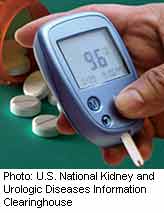Skipping breakfast increases postprandial hyperglycemia after lunch, dinner
MONDAY, Aug. 10, 2015 (HealthDay News) — Breakfast consumption influences glucose regulation throughout the day in patients with diabetes, according to a small study published online July 28 in Diabetes Care.
Daniela Jakubowicz, M.D., from Tel Aviv University in Israel, and colleagues conducted a crossover study in which 22 patients with diabetes (mean age, 56.9 years; body mass index, 28.2 kg/m²; and glycated hemoglobin, 7.7 percent) were randomly assigned to two test days: one day with breakfast, lunch, and dinner (YesB) and another with lunch and dinner but no breakfast (NoB).
The researchers found that lunch area under the curves for 0 to 180 minutes (AUC0-180) for plasma glucose, free fatty acids (FFA), and glucagon were 36.8, 41.1, and 14.8 percent higher, respectively, while the AUC0-180 for insulin and intact glucagon-like peptide-1 (iGLP-1) were 17 and 19 percent lower, respectively, on the NoB day compared with YesB (P < 0.0001). Dinner AUC0-180 for glucose, FFA, and glucagon were 26.6, 29.6, and 11.5 percent higher, respectively, while AUC0-180 for insulin and iGLP-1 were 7.9 and 16.5 percent lower, respectively, on the NoB day compared with the YesB day (P < 0.0001). On the NoB day, insulin peak was delayed 30 minutes after lunch and dinner, compared with the YesB day.
“Breakfast consumption could be a successful strategy for reduction of postprandial hyperglycemia in type 2 diabetes,” the authors write.
Copyright © 2015 HealthDay. All rights reserved.








